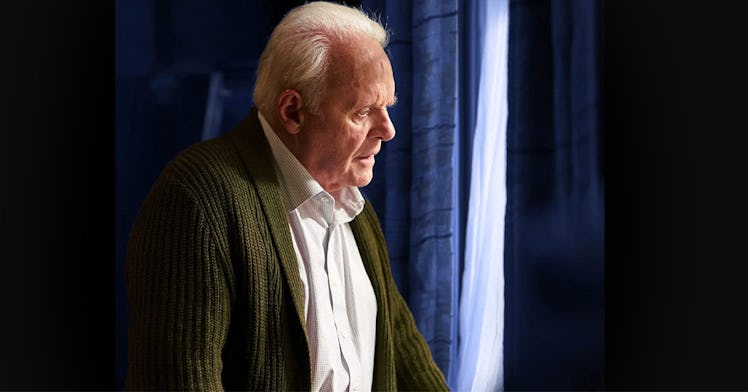Anthony Hopkins Deserves a Damn Oscar for ‘The Father’
Watch this one ASAP. And grab the tissues.

Anthony (Anthony Hopkins) is losing time – and his mind. Each day, the 80-something-year-old Brit awakens in his flat and grows increasingly disoriented, as if the hours and his surroundings are closing in around him – which they are. He’s confusing people and misplacing things, especially, most frustratingly and most metaphorically, his watch. The situation won’t ever improve; in fact, it will only worsen.
Such is the premise of The Father, a new film directed and co-written by Florian Zeller based on his acclaimed French play, Le Pere. Anthony’s loving daughter, Anne (Olivia Colman), does everything humanly possible to help her dad: keeping him in his flat, her flat, a nursing home, and hiring expensive, well-suited home-care workers whom Anthony charms, berates, and sends on their way one after the other. Anne is at a loss. Nothing she does satisfies Anthony and in offhanded, cutting ways, he makes it clear he prefers his (unseen) younger daughter, Lucy.Zeller, who presents most of the story from Anthony’s point of view, introduces a handful of characters and settings that amplify the character’s confusion and heightening desperation. At one point, Anne is seen as another woman (Olivia Williams), who is instead a nurse, Catherine. We see two versions of someone who may be Anne’s husband, Paul, played by Mark Gatiss and Rufus Sewell. Paul despises Anthony for ruining Anne’s life, and thus his, and at a certain point, in one of the film’s most disturbing moments, Paul gets physically abusive.Meanwhile, Zeller alters the appearance of Anthony’s flat, which appears to shrink in size and lose its more personal furnishings as the story progresses. In the stage version of The Father, stagehands removed pieces of a single set after each key scene. And, further, Zeller folds time and dialogue in on itself, immersing the moviegoer deeper in Anthony’s disorientation. What’s real vs what’s imagined and what’s happening now rather than the past goes unanswered. Hopkins invests himself fully in Anthony. Hopkins’ character is a proud man, a creature of habit, but he’s losing his battle to retain any semblance of order. He can pull it together during lucid moments. In one chilling scene, he charms his latest potential caretaker, Laura (Imogen Poots), even smiling and laughing as he performs a tap dance, only to pivot and verbally torment her. Hopkins skips from amiable/warm to silly to cruel in the span of two minutes, and that’s important because we don’t know if Anthony, in his prime, was amiable/warm, silly, or cruel – or all of the above. Zeller films Hopkins both in tight closeups and wide shots, and in the latter, Hopkins uses his whole body to fill the screen; be sure to watch the actor’s left arm throughout.All of the players – Colman, Sewell, Gattis, and Poots — around Hopkins complement his central performance. Sewell is almost too easy casting, as he can deliver sublimated menace in his sleep, but it’s still effective. Poots nails Laura’s sunny energy and then her mortified embarrassment. It’s through Anne, however, that we experience Anthony’s love, anger, fear of abandonment, lashing out, and despondency. Colman – with soft smiles and welling eyes — subtly conveys Anne’s affection, guilt, and pain. And her one-on-one moments with Hopkins are master classes in making a connection with a fellow actor. Hopkins and Colman both deserve their Oscar nominations.The Father is a deeply sad, but cathartic 97-minute-long experience. Hopkins and Colman burnish their stellar reputations, while Zeller – making his feature directing debut – establishes himself as a filmmaker to watch. The Father will surely touch the heart of anyone who sees this movie, but especially those with loved ones who have or are contending with dementia or Alzheimer’s. It’s not an easy watch, but well worth the emotional investment.
The Father is basically like a theatrical release that isn’t out in theaters. So, it’s $19.99 to rent on Amazon.
This article was originally published on